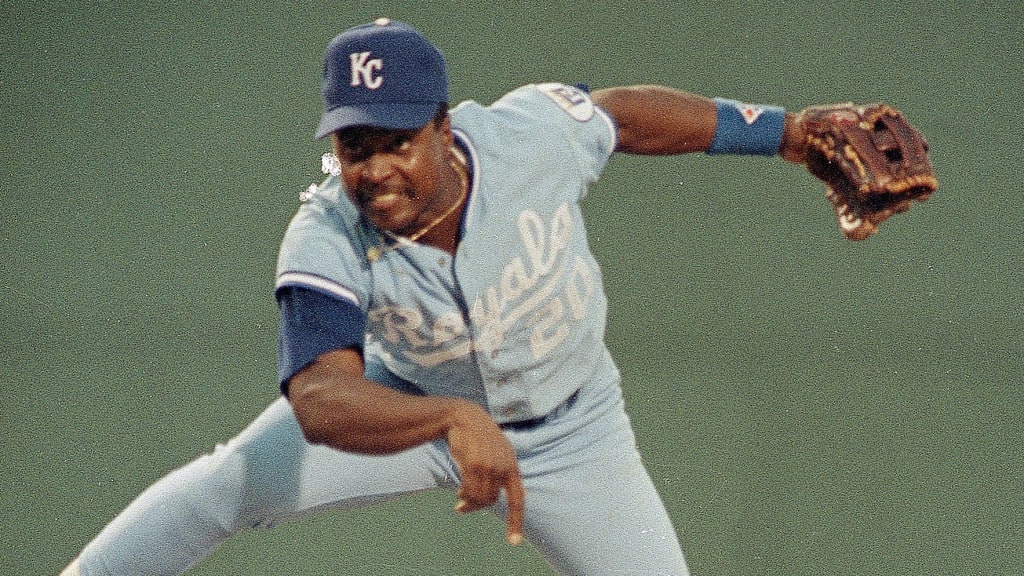
No one loves a good debate quite like baseball fans, and with that in mind, we asked each of our beat reporters to rank the top five players by position in the history of their franchise, based on their career while playing for that club. These rankings are for fun and debate purposes only.
Here’s our take on the top five second basemen in Royals history.
1. Frank White, 1973-90
Key facts: Five All-Star Games, eight Gold Glove Awards
OK, so there’s absolutely no debate about this choice. Frank White was not only the best second baseman in Royals history, but he is also one of the greatest defensive second baseman in baseball history.
White, the best success story of the once-famed Royals Baseball Academy in the 1970s, had a storied career with the Royals, earning a Most Valuable Player Award in the 1980 American League Championship Series.
Later in his career, White became a weapon at the plate, too. From 1984-87, White hit 78 home runs. His best offensive season came in '86, the year after the Royals won their first World Series championship, when he posted a .787 OPS with 37 doubles, 22 home runs and 84 RBIs.
But White’s calling card was his defense. Legendary scout Art Stewart said he never saw anyone turn a double play quicker and better than White. His defense also was recognized by his peers. The great Cardinals shortstop Ozzie Smith once said of White, “I often wondered what it would be like to have Frank as my team’s second baseman. Frank was the best, and it’s a shame he’s not in the Hall of Fame.”
White, now the county executive for Jackson County, Mo., is in the Royals Hall of Fame. A bronze statue of White resides at Kauffman Stadium. His No. 20 is one of three retired numbers in Royals history.
2. Whit Merrifield, 2016-2022
Key fact: Two-time All-Star Game, led MLB in hits in 2018 and '19
This is going to scream recency bias, and in truth, it was very hard not to put Cookie Rojas, a Royals Hall of Famer, in this spot. But Whit Merrifield -- although he became more of a super utility man in his later years with Kansas City -- put together some dynamic years at the plate and was a stalwart leader during some tough Royals seasons. And he certainly could hold his own at second base.
Merrifield appeared on everyone’s radar in 2017, when he hit .288 with a .784 OPS and led the AL in steals with 34. In 2018, Merrifield led MLB in hits with 192 and steals with 45. The next season, he led the Majors in hits with 206 and tied for the MLB lead in triples with 10.
Merrifield holds the franchise record for consecutive games played at 553, a record he set in 2021 and saw the streak end in ’22. He was traded to the Blue Jays at the Trade Deadline in 2022, ending his Royals tenure after seven seasons. He slashed .286/.332/.425 as a Royal, playing in 863 games and accumulating 16.8 bWAR.
3. Cookie Rojas, 1970-77
Key facts: Four-time All-Star with Royals
Cookie Rojas, the man who mentored White for his sensational career, was a stalwart up the middle for the Royals along with shortstop Freddie Patek. Rojas didn’t wield as strong of a bat as Merrifield, but he was pesky. Rojas hit .268 over eight seasons with the Royals.
Rojas’ best season in Kansas City came in 1971, when he hit .300 with a .763 OPS. He hit six home runs with 59 RBIs, and he also finished 14th in AL MVP Award voting.
4. Mark Grudzielanek, 2006-08
Key facts: One Gold Glove (won in first year with Royals)
Mark Grudzielanek’s time with Kansas City won’t trigger much emotion with the fan base, because he played during a few of the Royals' down years. But that was through no fault of his own.
Grudzielanek was a sound defender who could hit and get on base. In his three years with the Royals, he averaged .300 with a .752 OPS. His best season in Kansas City came in 2007, when he hit .302 with a .772 OPS, 32 doubles, six home runs and 51 RBIs.
5. Jose Offerman 1996-98
Key facts: Led MLB in triples in 1998
Jose Offerman's time with Kansas City was short, like Grudzielanek's, and he was an offensive weapon, much like Merrifield. But Offerman struggled mightily on defense, which is how he ended up being traded from the Dodgers to the Royals for left-hander Billy Brewer. With Los Angeles, Offerman committed 125 errors at shortstop from 1992-95.
Then-Royals manager Bob Boone converted Offerman into a second baseman to limit the defensive damage, and he also tried to convert the infielder into a first baseman. But Offerman could hit and run, that’s for sure. He averaged .306 in Kansas City with an .804 OPS. He also had 45 steals in 1998 before the Royals let him walk via free agency.
Honorable mentions
• Carlos Febles' 1999 season -- 22 doubles, nine triples, 10 home runs and 20 stolen bases with a .747 OPS -- got fans wondering if the Royals had filled the second-base hole. He faded after that, though.
• Ben Zobrist was a huge contributor to the Royals’ World Series championship run in 2015, not only at second base but also in left field when he filled in for an injured Alex Gordon.
• Christian Colón was part of two of the Royals' biggest postseason moments -- he scored the winning run in the 2014 Wild Card Game win over Oakland, and in his only postseason at-bat in '15, he drove in the go-ahead run in Kansas City's clinching Game 5 World Series win over the Mets.

